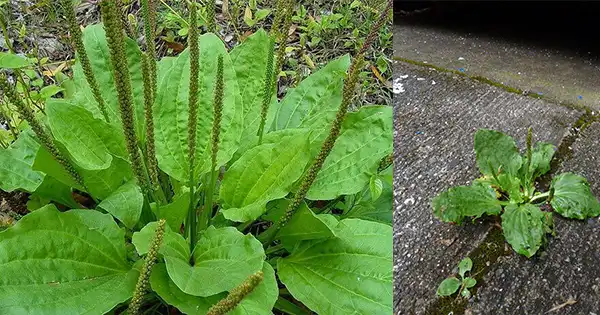In the vast tapestry of nature, certain plants often go unnoticed despite their remarkable array of benefits and uses. One such unpretentious wonder is Plantago major, commonly known as broadleaf plantain or greater plantain. Despite its humble appearance, this herbaceous plant possesses a hidden power that has been revered for centuries in herbal medicine and culinary traditions worldwide. In this article, we explore the hidden potential and versatile nature of Plantago major, shedding light on its medicinal, nutritional, and ecological significance.
Plantago major: An Introduction
- Botanical Profile: Plantago major belongs to the Plantaginaceae family and is characterized by its broad, oval-shaped leaves and inconspicuous flower spikes.
- Global Distribution: Native to Eurasia, Plantago major has naturalized in various regions globally, thriving in diverse climates and soil conditions.
- Cultural Significance: Throughout history, diverse cultures have recognized and utilized Plantago major for its medicinal properties, culinary uses, and ecological benefits.
Medicinal Marvels of Plantago major
- Anti-Inflammatory Properties: The leaves of Plantago major contain compounds with anti-inflammatory properties, making them valuable in treating skin irritations, insect bites, and minor wounds.
- Wound Healing: Poultices or extracts made from Plantago major leaves promote wound healing by reducing inflammation and supporting tissue regeneration.
- Respiratory Support: Herbal preparations of Plantago major are used to alleviate coughs, sore throats, and respiratory congestion, acting as a natural expectorant.
- Digestive Aid: Consuming Plantago major seeds or husks can support digestive health by relieving constipation and promoting bowel regularity.
- Antimicrobial Action: Studies suggest that certain compounds in Plantago major exhibit antimicrobial properties, aiding in the management of microbial infections.
Nutritional and Culinary Uses
- Edible Leaves: Young leaves of Plantago major are edible and can be incorporated raw into salads or cooked as nutritious greens rich in vitamins, minerals, and antioxidants.
- Seed Husks: Plantago major seeds, particularly the husks, are rich in dietary fiber, making them beneficial for digestive health and cholesterol management.
- Herbal Teas: Infusions made from Plantago major leaves or seeds are consumed as herbal teas, offering a mild, earthy flavor with potential health benefits.
Ecological Contributions
- Soil Remediation: Plantago major exhibits phytoremediation properties, absorbing pollutants from soil and water, thereby contributing to environmental cleanup efforts.
- Wildlife Habitat: The plant’s foliage and seeds serve as food sources for various insects, birds, and small mammals, supporting biodiversity in natural ecosystems.
- Erosion Control: Plantago major’s deep root system and spreading growth habit help stabilize soil, preventing erosion in disturbed or degraded areas.
Cultivating Appreciation for Plantago major
- Wild Harvesting: Ethical wild harvesting of Plantago major leaves and seeds ensures sustainable use while respecting natural ecosystems.
- Cultivation: Gardeners can cultivate Plantago major in home gardens, providing a fresh and accessible supply for culinary or medicinal purposes.
- Educational Outreach: Sharing knowledge about the benefits and uses of Plantago major promotes appreciation for nature’s resilient and beneficial plant species.
Conclusion: Nature’s Quiet Champion
Plantago major, often overlooked in mainstream discourse, emerges as a quiet yet potent champion in the realm of herbal medicine, nutrition, and environmental stewardship. Its unpretentious leaves and unassuming presence belie a wealth of medicinal, nutritional, and ecological benefits that have stood the test of time across cultures and generations. By recognizing and embracing the hidden power of Plantago major, we not only unlock nature’s wisdom but also nurture a deeper connection with the natural world and its invaluable gifts.

